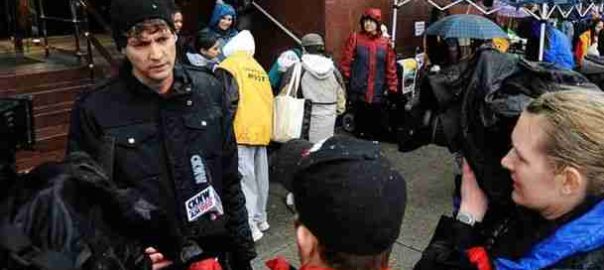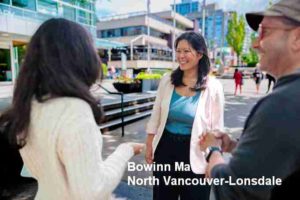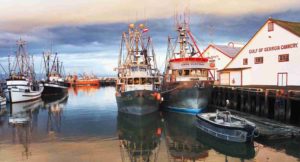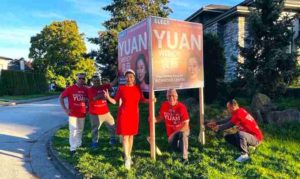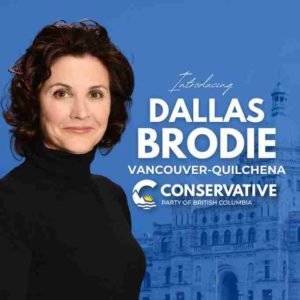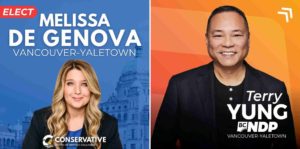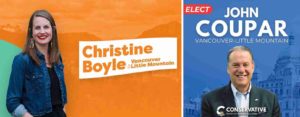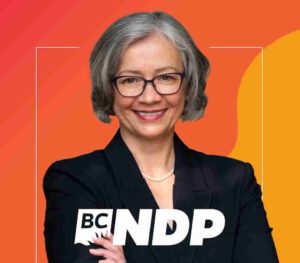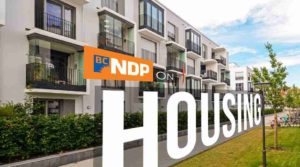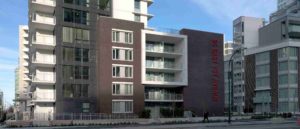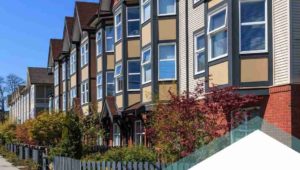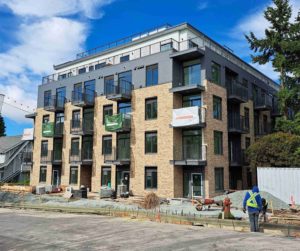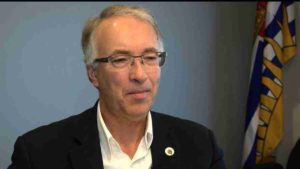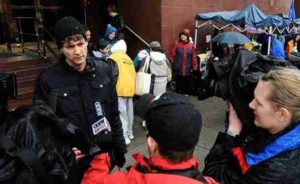
VanRamblings has known David Eby since he first arrived in town in 2007 to article with the grassroots and activist Pivot Legal Society, where he fought the good fight for the residents who reside on Vancouver’s Downtown Eastside.
In all the time we’ve known David — registering voters and getting the vote out in the 2009 provincial election, in his time as an activist Executive Director with the B.C. Civil Liberties Association, and working closely with David in his campaigns for provincial office in 2011, 2013, 2017 and 2020 — we’ve always been inspired by David Eby’s utter brilliance and command of the issues, his compassion and kindness, his ability to connect with people on a visceral level, his commitment to the public good, and for the welfare of everyone who has come to him for help.
Sadly, the David Eby we’ve known well for 17 years, and the David Eby who everyone who has worked with David knows so well and is so passionate about, has not been on display in the B.C. NDP 2024 campaign for office, as if somehow David is a lightning rod, and the campaign team wants to keep him under wraps.
What a terrible mistake the B.C. NDP campaign has made in “hiding” the David Eby those who care passionately about David know so well, and believe in David as the leader we know him to be, with all of our heart and conscience and utter devotion.
Today on VanRamblings, we’re going to introduce you to the David Eby we know well, and will suggest that it is David Eby, and David Eby alone, who will rescue the failed 2024 B.C. NDP campaign for office, that it is David Eby who will lead a 180-degree turnaround of the campaign, as the most inspiring and energizing presence on the hustings, a David Eby who many British Columbians will see for the very first time, a vigorous and tireless campaigner for the public good, in the sprint to the finish of a campaign that will conclude with victory on Saturday, October 19th.
First of all, something you may not know about David.
Our good Mr. Eby has a temper on him, and although not quick to anger, allow us to tell you from first-hand experience, you do not want to be on the receiving end of David’s anger — of course it is a directed and controlled anger, a good anger meant to redefine the circumstance in which one might find oneself, to inspire a change for the better.
In the lacklustre 2024 B.C. NDP campaign for office, we have not witnessed David’s anger — and, migawd, we should, we must — because the David Eby we know is right pissed off with what an antediluvian, regressive John Rustad Conservative administration would mean for the people of British Columbia.
In two words, chaos and hurt.
In the final two weeks of the 2024 B.C. election campaign, let us all see more righteous and palpable anger from David Eby, anger that will cause British Columbians to sit up and take notice, and say …
“Hey, this guy’s passionate about creating a better British Columbia for our family. This David Eby fella, he’s a leader, the kind of leader we need in 2024, someone who is passionate about fighting for us, and is committed to making our lives better.”
We’ll tell you something else you may not know about David Eby.
David Eby does not suffer fools gladly, least of all the so-called leader of the regressive Conservative Party of British Columbia. In the third day of the current campaign that became obvious, when reporters asked the NDP leader to respond to an allegation made by John Rustad that educators were indoctrinating students, so much so that his government would ban 4,000 books currently available in British Columbia schools, “including pornography made available to Grade 4 students as a part of the province’s SOGI 123 programme,” a programme designed to support gender variant children enrolled in our public education system with compassion.
CBC’s Michelle Elliot’s interview with John Rustad, where he says pornography is being made available to students enrolled in B.C.’s public education system, as part of the province’s SOGI 123 programme.
David’s Eby response to John Rustad’s absurd remarks was a roiling amalgam of anger, incredulousness and risible derision, as he rolled his eyes, stating to reporters that he was unsure if he’d ever heard anything more preposterous stated by a political leader. Going forward, the 2024 B.C. NDP campaign must hear, and witness, more fiery and passionate responses from B.C’s NDP leader, and more rolling of his eyes at the nonsensical rantings of the leader of the B.C. Conservatives.
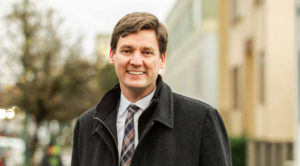
Now, something you already know about David Eby, the Premier of our province.
David Eby is a take charge kind of guy. We’ve seen that every day since he became Premier of British Columbia in November 2022.
Here’s a personal example we’ve experienced: In the 2017 British Columbia election campaign, VanRamblings as we’ve written previously worked the front desk in David Eby’s campaign office. One bright afternoon when David returned to the office following an hour of mainstreeting along West Broadway, from Macdonald to Alma, upon entering the premises David queried us as to how things were going. “Fine,” we said, to which David responded, “Raymond, I know you. You’ve got concerns. Spill. What’s going on? Give me the straight goods. C’mon now.”
We expressed to David that every second call we’d received that morning and early afternoon expressed a concern that although a constituent and supporter had ordered a David Eby re-election sign to be delivered, sometimes as long as two weeks previous, the signs had yet to arrive. David responded, saying, “Raymond, my car is out back. Load up the hatchback with 200 signs, and you and I will spend the afternoon delivering and putting up signs. I’ll get the list from Gala.”
In fact, the two of us spent three hours putting up signs. But we’re talking David Eby here. VanRamblings would put up a sign. David would frown, saying “Two signs, at the corner of the lot, one facing west, the other facing north, for maximum visibility.” And so it went. David Eby very much in control. 200 signs up in 3 hours, sign requests completely up to date, David Eby once again being the hands on, take charge candidate satisfied and energized. That’s the David Eby we know.
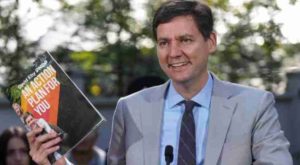
Let’s talk about the issues that David Eby is running on.
British Columbia’s Housing Shortage. David Eby, as the feet on the ground visionary leader of British Columbia, working with his 55-member B.C. NDP caucus, has developed a realistic, multi-faceted plan to build housing for …
- Members of our vulnerable population living on the streets, unhoused, or in substandard, rat-infested SROs located on Vancouver’s DTES, and similar areas in Prince George, Victoria, Kelowna, Nanaimo, and elsewhere will find accommodation in dignified housing in David Eby’s next term in office;
- Seniors who have found themselves poorly housed, or on the verge of eviction arising from the build, build, build ethos of developers will be afforded accommodation in dignified, and supported where necessary, housing where no resident will pay more than 30% of their income to be housed;
- Individuals with incomes between $30,000 and $88,000 annually, where one hundred thousand units of co-op housing will be built across the province on federal or provincial Crown land, a place you would own collectively with your neighbours, where no housing co-op member would pay more than 30% of their annual income in housing charge, where vulnerable, low income seniors, and families would be housed in safety and comfort;
- British Columbians earning an income between $88,000 and $254,000 annually, there’s the B.C. Builds programme, dedicated to the development of new homes for middle-income working people living in communities throughout British Columbia;
- British Columbians who want to own their own homes, where the B.C. NDP would subsidize 60% of the purchase of a home for first time buyers, and 40% of the purchase price of a home for homeowners who wish to upgrade their housing, in both instances allowing the new homeowners to reimburse government over a 25-year period for the portion of the house purchase subsidized by the province.
David Eby’s government is committed to training and hiring 700 new doctors, and 1500 new nurses each year until every British Columbian has a family doctor, and where wait times for those entering hospital are reduced or eliminated.
David Eby is the man with the plan, running against a tired old, right wing ideologue, bereft of ideas, not on your side, with no action plan whatsoever.

On Thursday, David Eby announced the B.C. NDP’s public transportation programme, which includes an extension of the Millennium line to UBC; a light rail system to Squamish and Whistler; and a rapid bus system to the North Shore, to eventually be replaced by light rail transit or Skytrain, and much more.
In the sprint to the finish in Campaign 2024, David Eby will have to dramatically up his energy level, develop the fire in his belly style of campaigning that Justin Trudeau perfected in the 2019 and 2021 federal election campaigns, where Trudeau carried a flagging Liberal party campaign on his back, emerging in both instances with a substantial minority government.
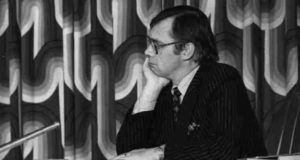
The Honourable Thomas R. Berger, leader of the British Columbia New Democratic Party in 1969.
There’s been some talk among the punditry that has suggested in 2024 David Eby and the B.C. NDP are running a losing 1969 Tom Berger campaign.
B.C. NDP leader Tom Berger in 1969 ran a progressive campaign for office, but was viewed by the public as that most hoary of things: an “intellectual”, his style of campaigning human scale and reasoned, but devoid of warmth and the signifying entertainment value that always defines a successful campaign for office.
When the 1969 election results came in late on the summer evening of August 27th, British Columbians had wholly rejected Tom Berger as B.C. NDP leader, awarding him only 18 seats — for a loss of four seats, including Mr. Berger’s own seat of Vancouver Burrard — in a 55-seat Legislature, instead re-electing the tired administration of Premier W.A.C. Bennett to a seventh consecutive term in office.
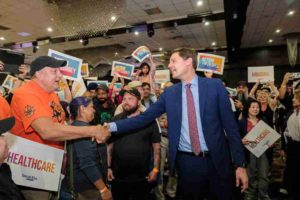
The David Eby VanRamblings knows will not, under any circumstance, allow his and our B.C. New Democratic Party campaign to falter and fail, and will in these final two weeks of Campaign 2024 turn on the jets to run a high energy, inspiring, populist campaign for office, a take charge campaign where David Eby will be louder, angrier, more pointed in his criticism of B.C. Conservative leader John Rustad, more visible and surrounded by thousands of supporters in ridings spanning the province, the galvanizing leader we know him to be and need him to be, imbued with the spirit and best interests of British Columbians front and centre in his campaign, rallying the citizens of our province in common cause to ensure going forward that there will be accessible and ready health care services for everyone, housing for everyone, a vibrant public transportation system, and a thriving green economy, the touchstones of the British Columbia New Democratic Party’s winning campaign for office in the 2024 British Columbia provincial election.
